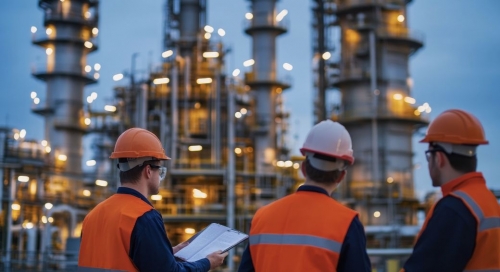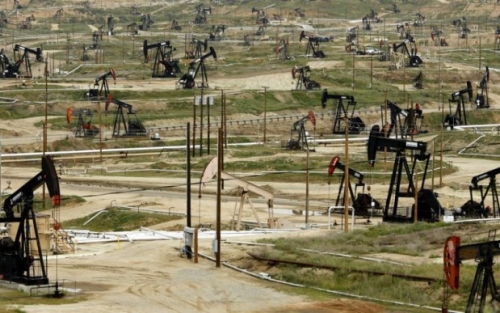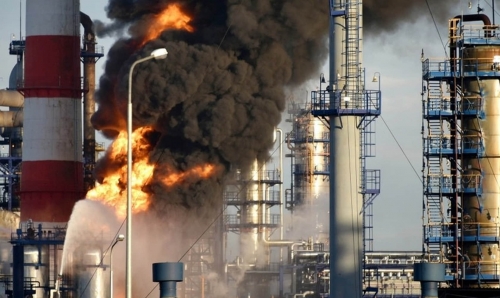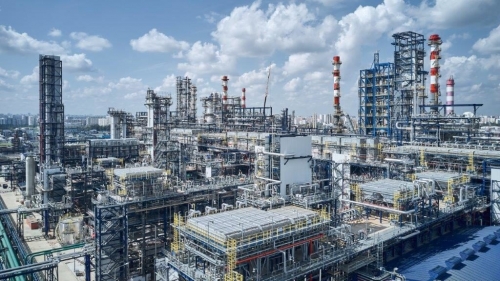A bearish week for oil and gas benchmarks, amid economic and demand concerns as US tariffs took effect on dozens of trading partners.
BKR Rig Count | The total active drilling rigs in the United States decreased by 1 last week, to 539. Oil rigs increased by 1 to 411, and gas rigs dropped by 1 to 123. Rig count in the Permian Basin dropped by 3 to 256 | Aug 8 | BKR NAM Rig Count
US Crude Inventories, excluding those in the Strategic Petroleum Reserve (SPR), decreased by 3 MMbbl to 423.7 MMbbl (about 6% below the 5y average for this time of year). On the products side, gasoline decreased by 1.3 MMbbl (1% below the 5y average). Distillate fuels decreased by 0.6 MMbbl (16% below the 5y average). Total commercial petroleum inventories increased by 2.1 MMbbl | Aug 1 | EIA Weekly Report
Oil swung in choppy trading as investors assessed whether a prospective deal by the US and Russia to halt the war in Ukraine would receive international support and materially affect Russian crude flows. The US and Russia are aiming to reach a deal that would lock in Russia’s occupation of territory seized during its invasion. “A possible truce would be only modestly bearish crude – assuming there is no lifting of EU and US sanctions against Russian energy – since the market does not currently price in much disruption risk” said Bob McNally, Rapidan Energy Group founder and former White House official | Aug 8 | Bloomberg
Washington's efforts to restrict Russian oil flows to India are raising questions about what will happen to the oil that would otherwise have been headed to the subcontinent. China is the most likely destination for the excess oil, but it tends to fret about excessive dependence on a single supplier and its refiners may not be able to absorb many more barrels. If a significant portion of the crude can't find takers, the hit to supply could push global oil prices higher, with Capital Economics estimating a $10 to $20 a barrel increase | Aug 8 | Bloomberg
President Trump doubled tariffs on Indian goods to 50% as a penalty for its purchases of Russian oil, according to the White House. India's government said the purchases are necessary for the nation's energy security and called Trump's actions "unfair, unjustified and unreasonable". Trump's move has been characterized by some Bloomberg economists as "leverage, not policy", as he hasn't imposed similar penalties on other major buyers of Russian crude, including China | Aug 6 | Bloomberg
The oil market is trying to ease a global diesel crunch, but the window to replenish stockpiles is narrowing due to upcoming hurricanes and refinery maintenance. Traders say it's going to be a tight race to refill storage tanks, which have recently started rising from dramatically low levels, with most expecting no major easing of prices. Higher diesel prices can have wide-reaching ramifications for the global economy, including rippling through inflation readings and denting consumer and business confidence, according to warnings from Goldman Sachs and TotalEnergies | Aug 7 | Bloomberg
Egypt canceled about half of its plan to buy fuel oil shipments after securing massive amounts of LNG to help meet its electricity generation needs. Egyptian General Petroleum Corp. was said to have canceled seven cargoes of fuel oil totaling about 2.2 million barrels. Egypt is seeking to reschedule LNG imports to cover power generation demand in late August after imports surged in July | Aug 8 | Bloomberg
The Bank of England cut interest rates by a quarter point to 4%, the lowest in over two years, that leaves investors with what Governor Bailey called "genuine uncertainty" on its next move. New forecasts warn that inflation will now hit 4% in September - a reading that would double its target and arrive just weeks before its next projections in November | Aug 7 | Bloomberg
German industrial production suffered its biggest drop in almost a year, with output declining 1.9% in June from the previous month. The drop could mean that the economy shrank by 0.2% rather than the 0.1% initially estimated, according to the chief economist at Berenberg. Bloomberg expects the near-term outlook to remain gloomy, with US trade policy acting as a drag on an already struggling sector | Aug 7 | Bloomberg
Looking ahead
China’s independent oil companies boost investments in Iraq, aiming to double their production to 500,000 b/d by 2030. The smaller Chinese producers, led by industry veterans, are drawn to Iraq by more attractive contract arrangements and the potential to leverage lower costs and faster project development. Geo-Jade Petroleum, United Energy Group, Zhongman Petroleum and Natural Gas Group, and Anton Oilfield Services have secured half of Iraq's exploration licences in recent rounds. Currently, CNPC is a major player, responsible for more than half of Iraq's production at large oilfields such as Haifaya, Rumaila and West Qurna 1. Iraq’s shift from fixed-fee agreements to profit-sharing contracts has been instrumental in attracting Chinese independents. Geo-Jade Petroleum CEO Dai Xiaoping said: “Chinese independents have much lower management costs compared to Western firms and are also more competitive versus Chinese state-run players.” While some Western companies are making a comeback, with TotalEnergies and bp planning significant investments, the trend of Chinese operators' expansion in Iraq's oil sector is clear. In May, a consortium spearheaded by Geo-Jade decided to fund the South Basra endeavour, encompassing the enhancement of the Tuba field in Iraq's southern region to a capacity of 100,000b/d. This included the construction of a refinery capable of processing 200,000 b/d. With an investment pledge of $848m, Geo-Jade is set to rejuvenate production at the predominantly idle field, aiming to achieve production of 40,000b/d by mid-2027 | Aug 5 | GlobalData
The World Is Far Off From a Landmark Goal to Triple Renewables | Targets put forward by national governments for the rollout of technologies like wind and solar will bring global installations far short of what countries committed to at the United Nations COP28 summit in 2023, according to Ember, a climate think tank. The renewable goal was agreed in Dubai as part of a hard-fought deal to commit to a transition away from fossil fuel. Ember calculated the world will hit just 7.4 terawatts of renewable energy capacity by 2030, a little more than double the 3.4 terawatts installed in 2022, based on national targets. The world needs 11 terawatts in order to meet the tripling goal. “There is a real disconnect between the sort of high level agreement to sign pledges at COP and then the reality of how electricity planning is done,” Katye Altieri, global electricity analyst at Ember, said. “National targets send policy signals to the market and I think countries have lost sight of that.” The findings underscore the key issue facing international climate talks, and one that will likely dominate the COP30 summit in the Brazilian city of Belem this November: Countries are very good at talking the talk once a year, but bad at actually implementing the promises they’ve made. Ember’s research found only 22 countries have revised their renewable targets since Dubai, and most of those nations are in the European Union, which campaigned for the renewables pledge and have put new laws in place to achieve its objective to cut emissions by 55% by 2030 from 1990 levels. Group-of-20 nations like China and South Africa are expected to still come forward with more ambitious climate targets this year, but others like Canada, Russia and Turkey have yet to do so, and probably won’t before the summit in Belem, according to Ember. The US, which hasn't put forward a 2030 renewable target, is very unlikely to do so. President Donald Trump is withdrawing the US from the Paris Agreement and rolling back many of the clean energy programs put in place under Joe Biden, such as the Inflation Reduction Act. Among some glimmers of good news: India hasn’t updated its ambition, but Delhi’s 2030 target of 500 gigawatts of fossil fuel-free energy is aligned with the tripling goal, the report found. Perhaps surprisingly, Saudi Arabia is also on track for meeting its share, too. For Ember’s Altieri, it won’t take much to get the clean energy transition to snowball, but targets are needed to make sure that countries think about where they place renewables and the kind of infrastructure, like grids and battery storage, that’s needed to accompany it. “It’s not about target setting for the sake of target setting,” she said. “The economics are there for every country in the world” | Jul 30 | Bloomberg

%20(1).png)



